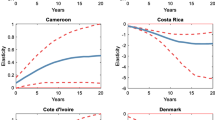Abstract
Many developing countries are trying to improve their economic conditions by means of structural adjustment programmes. The following article points out the weaknesses of such programmes and draws conclusions about the support that should be given to economic reform in developing countries in the future.
Similar content being viewed by others
References
See in this connection the examples of Mauritius, Kenya, Bolivia and Haiti, in: R. Shams: Adjustment Constraints in Developing Countries, in: INTERECONOMICS, Vol. 24, No. 2, 1989, pp. 71–78.
Cf. P. Waller and W. Zehender: Erfolgsfaktoren für Strukturanpassung in westafrikanischen Ländern, Deutsches Institut für Entwickungspolitik, Berlin 1989, p. 16.
See P. Waller and W. Zehender, op. cit., Erfolgsfaktoren für Strukturanpassung in westafrikanischen Ländern, Deutsches Institut für Entwickungspolitik, Berlin 1989, p.55.
The cumulative loss sustained by the developing countries on all primary products except petroleum was US$ 57 billion in the period 1981–85 by comparison with 1980; this represented 54% of their 1980 export receipts. See C. Fortin: Importance et conséquences de la chute des prix pour les exportations des PVD, in: Le Courrier, No. 116, 7/8 1989.
Cf. J. Zattler: Konzeptionelle Schwächen, Erfahrungen mit dem Strukturanpassungsprogramm Benin, in: epd—Entwicklungspolitik, No. 13, 1989.
Cf. Neue Zürcher Zeitung, 5th January 1989.
See H. Brandt and H. Lembke: Entwicklungshilfe als Dauerzuwendung am Beispiel der Sahelländer, Deutsches Institut für Entwicklungspolitik, Berlin 1989, p. IV.
See R. Barthelt: Afrika darf kein ‘Sozialfall’ werden, in: Entwicklung und Zusammenarbeit, No. 2, 1989.
R. Bodemeyer rightly points out that in African countries “a centralised, sectorally fragmented bureaucracy is a functional requirement resulting from a particular way of establishing and preserving political domination”. However, to conclude from this that “reform strategies that break down the concentration of power and/or sectoral power bases, ... [are] likely to jeopardise the system of domination in developing countries” (see R. Bodemeyer: Dezentralisierung in Afrika—eine realistische Strategie?, in: H. F. Illy and B.-O. Bryde: Staat, Verwaltung und Recht in Afrika 1960–1985, Berlin 1987, p. 169) misses the point. As shown above, economic reforms are bound to have political implications. Decentralisation offers the chance of providing political underpinning for economic reforms aimed at countering the “urban bias”. Decentralisation can therefore be a means of ensuring that the reforms occur against a background of political stability.
R. Barthelt, op. cit. Afrika darf kein ‘Sozialfall’ werden, in: Entwicklung und Zusammenarbeit, No. 2, 1989.
See W. Hankel: Zur Geld- und Kreditpolitik der Entwicklungsländer unter dem Aspekt der Stabilisierungspolitik, in: GTZ: Stabilisierungs- und Strukturanpassungspolitiken in Entwicklungsländern, pp. 62 ff., Rossdorf 1988.
See G. Lachenmann: Anmerkungen zu den gesellschaftlichen Aspekten der Strukturkrise in Afrika, Deutsches Institut für Entwicklungspolitik, Berlin 1987.
Initial operational considerations along these lines were made for the World Bank by Stein Hansen: Structural Adjustment Programs and Sustainable Development, May 1988, and by Robert Repetto: Economic Policy Reform for Natural Resource Conservation, May 1988.
Author information
Authors and Affiliations
Additional information
The opinions expressed in this article represent the personal view of the author.
Rights and permissions
About this article
Cite this article
Zattler The effects of structural adjustment programmes. Intereconomics 24, 282–289 (1989). https://doi.org/10.1007/BF02924735
Issue Date:
DOI: https://doi.org/10.1007/BF02924735




